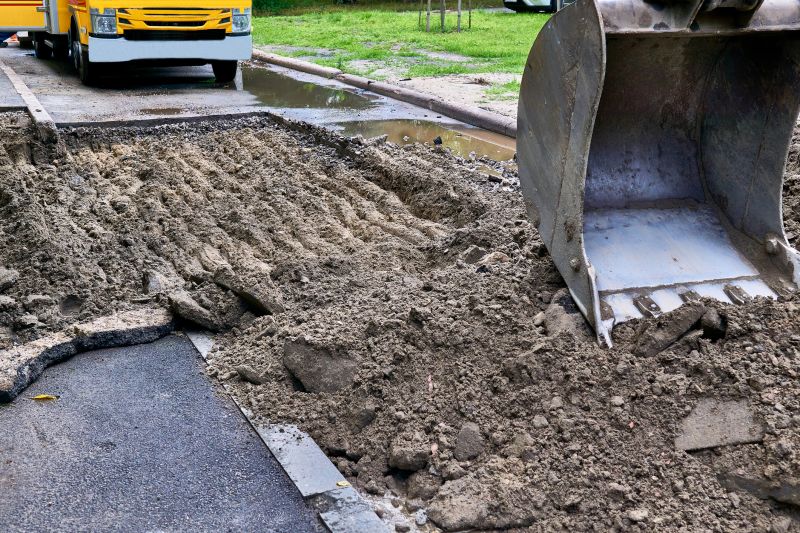Leading Products for Driveway Excavation Service Success
Identify top-performing tools and machinery that support efficient and high-quality driveway excavation work.
 Driveway excavation is a fundamental step in creating a durable and functional access point to a property. The process involves removing soil, gravel, or existing pavement to prepare the site for new installation or repair. Proper excavation ensures that the driveway surface is level, stable, and capable of supporting the weight of vehicles over time. Depending on the scope of the project, various tools and equipment are utilized to achieve precise and efficient results.
Driveway excavation is a fundamental step in creating a durable and functional access point to a property. The process involves removing soil, gravel, or existing pavement to prepare the site for new installation or repair. Proper excavation ensures that the driveway surface is level, stable, and capable of supporting the weight of vehicles over time. Depending on the scope of the project, various tools and equipment are utilized to achieve precise and efficient results.
Top Overall Option
Heavy-Duty Excavation Bucket
A heavy-duty excavation bucket designed for skid steers and compact excavators offers robust performance for removing soil, gravel, and debris efficiently. Its durable construction and versatile size make it suitable for various driveway excavation projects, providing precise control and stability during operation.
Types of Products For Driveway Excavation Service
Mini Excavators
Compact machines ideal for small to medium driveway projects, offering maneuverability in tight spaces.
Skid Steer Loaders
Versatile equipment suitable for excavation, grading, and material transport on driveway sites.
Excavation Buckets
Various bucket attachments designed for specific tasks like digging, trenching, and material removal.
Hydraulic Breakers
Tools used to break through concrete or hard soil during driveway demolition or preparation.
Plate Compactors
Equipment used to compact soil, gravel, or asphalt to ensure a stable driveway foundation.
Vibratory Rollers
Heavy machinery that provides thorough compaction over larger areas, ideal for driveway base layers.
Shovels and Spades
Hand tools essential for detailed digging and adjustments in small or delicate areas.
Rippers and Clamshell Buckets
Attachments designed for breaking up tough soil or removing debris efficiently.
Laser Levels
Tools to ensure precise grading and leveling of the driveway surface during excavation.
Soil Stabilizers
Products that improve soil strength and reduce shifting or settling over time.
Drainage Pipes and Materials
Components used to incorporate proper drainage solutions into driveway construction.
Gravel and Crushed Stone
Aggregate materials for base layers or surfacing, providing stability and drainage.
Geotextile Fabrics
Materials used to reinforce soil and prevent mixing of subgrade and base layers.
Edge Restraints
Products to define and contain driveway boundaries, preventing erosion and shifting.
Concrete Mixers
Equipment for mixing concrete if the driveway includes poured sections or borders.
Hand Tamper
Manual tool for compacting small areas or detailed work where machinery is impractical.
Popular Choices
Widely used for their versatility and ability to handle multiple tasks in driveway excavation.
Preferred for small to medium projects due to their compact size and maneuverability.
Commonly selected for soil and gravel compaction to prepare a solid base.
Popular for achieving consistent compaction over larger areas of driveway base.
Frequently used for breaking up concrete or hard soil during driveway demolition.
A common choice for reinforcing soil and improving stability in driveway construction.
Essential materials often favored for their drainage properties and base support.
Frequently selected to ensure proper water runoff and prevent pooling issues.
Common hand tools relied upon for detailed or small-scale adjustments.
Popular for maintaining driveway boundaries and preventing erosion.
Frequently used to achieve precise grading and leveling during excavation.
Often chosen to enhance soil strength and reduce future settling issues.
Choosing the right products for driveway excavation can significantly influence the quality and longevity of the finished surface. From heavy-duty machinery to hand tools, each product plays a role in addressing specific challenges such as soil type, driveway size, and accessibility. Ensuring that the tools and materials used are appropriate for the task can help avoid common issues like uneven surfaces, drainage problems, or structural instability.
Safety considerations are paramount during excavation projects. Proper protective gear, stable equipment, and adherence to safety protocols help prevent accidents. Additionally, understanding the characteristics of the soil and underlying materials can guide the selection of suitable products, such as appropriate excavation buckets or compaction tools. Planning and preparation are essential to minimize disruptions and ensure a smooth workflow from start to finish.
Investing in quality products tailored for driveway excavation can lead to more efficient work and better results. Whether undertaking a small repair or a large installation, the right equipment and accessories can make a significant difference in project outcomes. Carefully evaluating the available options and considering the specific needs of the site will help in selecting products that support a successful excavation process.
Key Buying Considerations
- Project size and scope to determine suitable equipment capacity.
- Soil type and conditions to select appropriate tools and materials.
- Accessibility of the work site for machinery and equipment transport.
- Compatibility of attachments with existing machinery for versatility.
- Power source availability, such as electric or fuel-powered equipment.
- Ease of operation and safety features for user protection.
- Durability and build quality of tools and machinery to withstand demanding use.
- Availability of replacement parts and maintenance support.
- Budget constraints balanced with quality and functionality.
- Compatibility with existing tools or machinery on-site.
- Environmental conditions that may influence equipment choice.
- Specific project requirements like drainage, grading, or material removal.
- Local regulations or permits related to excavation work.
- Storage and transportation considerations for larger equipment.
- User skill level and need for professional versus DIY tools.
